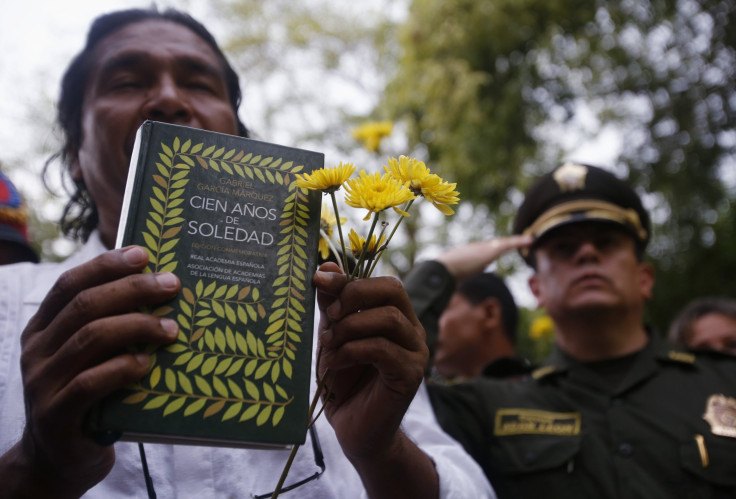
On the one year anniversary of his death, Gabriel García Márquez will still have the number-one-selling novel in Mexico: “100 Years of Solitude.” With over 30 million copies sold worldwide, the Nobel Prize winner's work is rivaled in sales only by the first Spanish novel, Don Quixote. Márquez’ work accomplished story and and prose that was both popular and timeless, deeper and richer than the pulp philosophy of authors like Paulo Coelho but more accessible that dense critic darlings such as Salman Rushdie.“I first read García Márquez in graduate school,” Edith Grossman, Márquez’ most prolific translator told the Guardian when Márquez passed away last year. “The novel was ‘Cien años de soledad,’ and I was overwhelmed. There hasn't been a novel, before or since, quite like that one.”
Like Don Quixote, “One Hundred Years of Solitude” ushered in a new kind of novel, a new genre or set of genres that can’t be described by the simple term “magical realism.” “One Hundred Years of Solitude” also cyclic, disorienting, and perhaps just plain magical in a way that other authors like Isabel Allende and others would go on to interpret in different ways, mixing time and space and emotions in mashed up inter-generational dramas involving Latin American families, mythology and lore. What were the most magical lines? We think these are pretty high up there, but add your own favorites in the comments if you think it should be on the Top Ten.
“The secret to enjoying old ages is nothing more than to honor a pact with solitude.” -Gabriel García Márquez, One Hundred Years of Solitude
“Aureliano [...] dug so deeply into her sentiments that in search of interest he found love, because by trying to make her love him he ended up falling in love with her. Petra Cotes, for her part, loved him more and more as she felt his love increasing.” -Gabriel García Márquez, One Hundred Years of Solitude
“For a week, almost without speaking, they went ahead like sleepwalkers through a universe of grief, lighted only by the tenuous reflection of luminous insects, and their lungs were overwhelmed by a suffocating smell of blood.” -Gabriel García Márquez, One Hundred Years of Solitude
“Ursula suddenly realized that the house had become full of people, that her children were on the point of marrying and having children, and that they would be obliged to scatter for lack of space. Then she took out the money she had accumulated over long years of hard labor, made some arrangements with her customers, and undertook the enlargement of the house.” -Gabriel García Márquez, One Hundred Years of Solitude
“Many years later, as he faced the firing squad, Colonel Aureliano Buendía was to remember that distant afternoon when his father took him to discover ice....” -Gabriel García Márquez, One Hundred Years of Solitude
“She went back to eating earth. The first time she did it almost out of curiosity, sure that the bad taste would be the best cure for the temptation. And, in fact, she could not bear the earth in her mouth. But she persevered, overcome by the growing anxiety, and little by little she was getting back her ancestral appetite, the taste of primary minerals, the unbridled satisfaction of what was the original food.” -Gabriel García Márquez, 100 Years of Solitude
“Fernanda was scandalized that she did not understand the relationship of Catholicism with life but only its relationship with death, as if it were not a religion but a compendium of funeral conventions.” -Gabriel García Márquez, One Hundred Years of Solitude
“Her heart froze with terror as she connected her daughter’s evening baths with Mauricio Babilonia. She asked the mayor to station a guard in the backyard because she had the impression that hens were being stolen. That night the guard brought down Mauricio Babilonia as he was lifting up the tiles to get into the bathroom where Meme was waiting for him, naked and trembling with love .” -Gabriel García Márquez, One Hundred Years of Solitude
“At the final moment, however, Amaranta did not feel frustrated, but, on the contrary, free of all bitterness because death had awarded her the privilege of announcing itself several years ahead of time. She saw it on one burning afternoon sewing with her on the porch a short time after Meme had left for school. She saw it because it was a woman dressed in blue with long hair, with a sort of antiquated look, and with a certain resemblance to Pilar Ternera during the time when she had helped with the chores in the kitchen.” -Gabriel García Márquez, One Hundred Years of Solitude
“There is always something left to love.” -Gabriel García Márquez, One Hundred Years of Solitude
© 2025 Latin Times. All rights reserved. Do not reproduce without permission.


